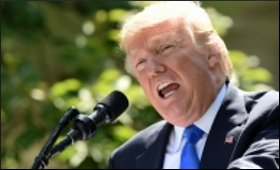|

|
Trump's threat against North Korea: Credible or premature articulation?
|
|

|
|
| Top Stories |
 |
|
|
|
Mayank Chhaya | 11 Aug, 2017
The
problem with issuing a dire ultimatum as a first response to a traditionally
bellicose regime is that the one issuing it is boxed in. That could well be the
problem that President Donald Trump could likely face as he deals with North
Koreas supreme leader Kim Jong-Uns increasingly aggressive moves threatening
the United States.
In a statement that is said to have taken the national security establishment
by surprise, the US president said: "North Korea best not make any more
threats to the United States. They will be met with fire and fury like the
world has never seen." This came in the aftermath of unconfirmed reports
that US intelligence had learned that Pyongyang has produced miniaturised
nuclear warheads that can be mounted on a missile.
Coupled with the fact that it now has long-range intercontinental ballistic
missiles (ICBMs) capable of reaching the United States, the latest unconfirmed
intelligence is certainly worrisome. However, through the retaliatory threat of
unleashing "fire and fury like the world has never seen", thereby
clearly implying a nuclear strike, Trump's statement may turn out to be one too
soon.
Rather than feeling chastised, North Korea seems to feel emboldened as its
state-run Korean Central News Agency (KCNA) issued several statements,
including the one that said the government was "carefully examining"
plans to launch missiles at the US-controlled island of Guam in the Pacific
Ocean. The island is a greatly significant US strategic outpost in the
Asia-Pacific region, 28 per cent of which is occupied by the military. There
are currently 6,000 U.S. military personnel stationed there and there are plans
to add another 5,000 marines by 2022.
A day after the US president's "fire and fury" threat, Pyongyang
upped the ante, calling it a "load of nonsense" on August 9. It went
a step further by issuing an even more specific threat to fire four missiles
that it said would land within 40 kilometers of Guam as a sort of a shot across
the bow.
That Pyongyang intensified its original threat barely 24 hours later in the
face of the unprecedented warning from the US president speaks of the
imprudence of his response. It is the kind of ultimatum that has to be backed
with action without which Washington will have no next step as Pyongyang
continues to ratchet up its aggression. Kim Jong-Un considers nuclear weapons
as his only guarantee of survival in the face of mounting international
pressure on him. He is not going to give those up, no matter what the
international community might say or do.
Guam's 3,400-mile distance from Pyongyang is well within its strike
capabilities and it is not altogether inconceivable that the mentally-besieged
supreme leader might actually carry it out. If that happens, Trump can always
retaliate well below his "fire and fury like the world has never
seen" threat but that would expose his bluster to Kim, something America
cannot afford. The 33-year-old Kim sees nuclear weapons as equalising him with
the 71-year-old Trump despite such massive chasm between the two countries'
military and economic strengths.
At a personal level, the idea that he is able to provoke a strong response from
the US president senior to him by nearly four decades is bound to give Kim a
considerable thrill. Traditionally, the North Korean leadership has thrived on
such saber-rattling and now that the sabre has a nuclear edge, it is expected
to make diplomatic intercourse with him that much harder.
The US president's statement is in direct conflict with his own Secretary of
State Rex Tillerson just a few days ago. "We do not seek a regime
change," Tillerson said on August 1 before he set off on a visit to the
Philippines, Malaysia and Thailand. "We do not seek the collapse of the
regime, we do not seek an accelerated reunification of the peninsula, we do not
seek an excuse to send our military north of the 38th parallel," he said.
A little over a week later the situation has taken a 180-degree turn with
reports of Pyongyang being able to miniaturise nuclear warheads, stringent
United Nations sanctions against North Korea, Trump's extraordinary statement
and Pyongyang's threat against Guam.
The "fire and fury" statement has startled many. Republican Senator
John McCain (Arizona), not known to shy away from wars, said in a radio
interview: "I take exception to the president's comments because you've
got to be able to do what you say you're going to do. In other words, the old
walk softly but carry a big stick, Teddy Roosevelt's saying, which I think is
something that should've applied because all it's going to do is bring us
closer to a serious confrontation."
It is hard to make concession in the name of Trump's characteristic penchant
for hyperbole and bluster because he is dealing with a leader who has lived
outside international norms in the tradition of his father Kim Jong-Il and
grandfather Kim Il-sung. Unless the US president thinks that he can conduct his
country's foreign policy with a measure of matching cavalier style, his threat
might turn out to be a case of premature articulation.
|
|
|
| |
|
|
|
|
|
|
|
|
|
|
|
|
|
|
| |
| Customs Exchange Rates |
| Currency |
Import |
Export |
US Dollar
|
84.35
|
82.60 |
UK Pound
|
106.35
|
102.90 |
Euro
|
92.50
|
89.35 |
| Japanese
Yen |
55.05 |
53.40 |
| As on 12 Oct, 2024 |
|
|
|
|
|
|
|
| Commented Stories |
 |
|
|
|
|
|
| |
|